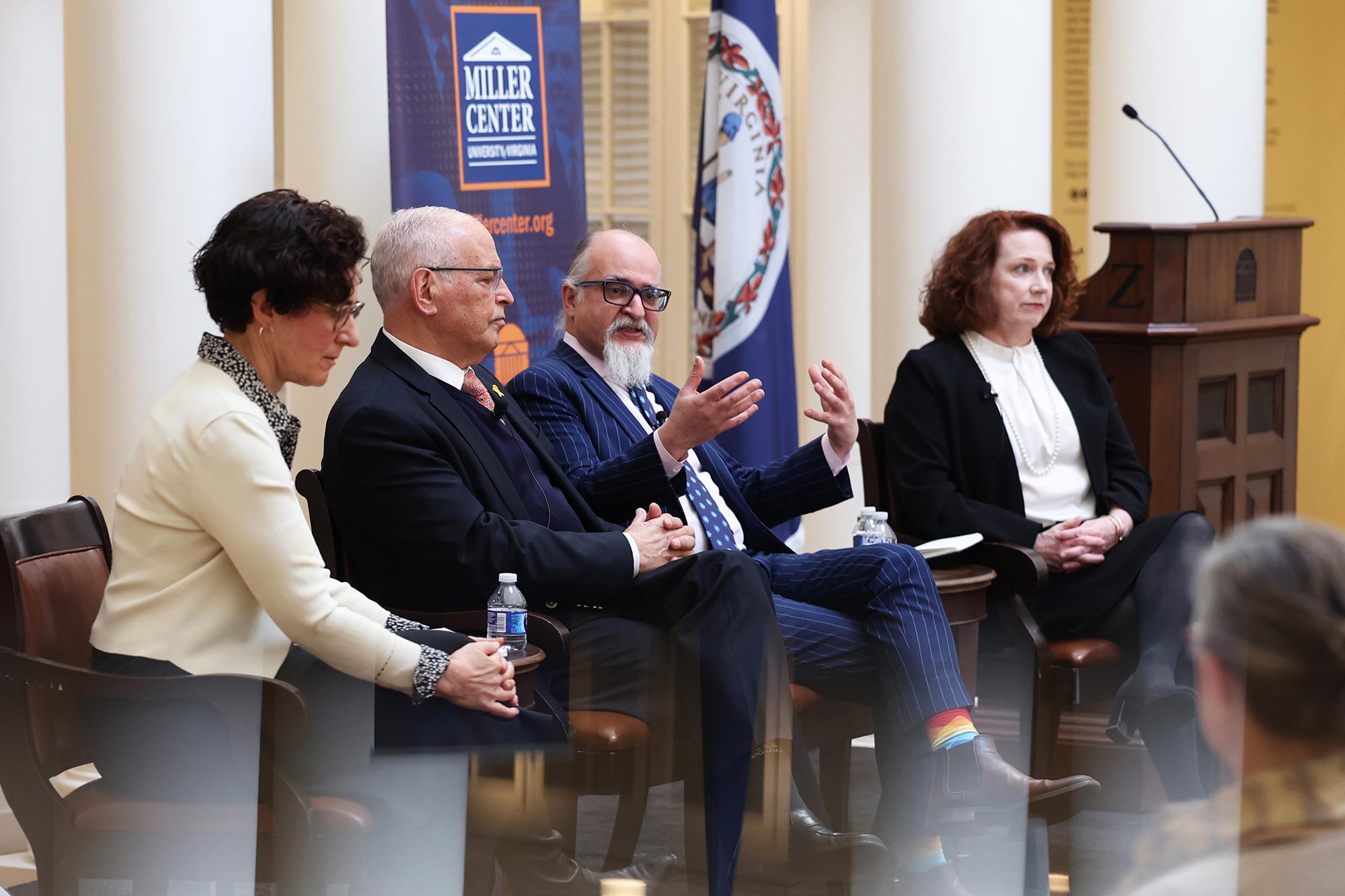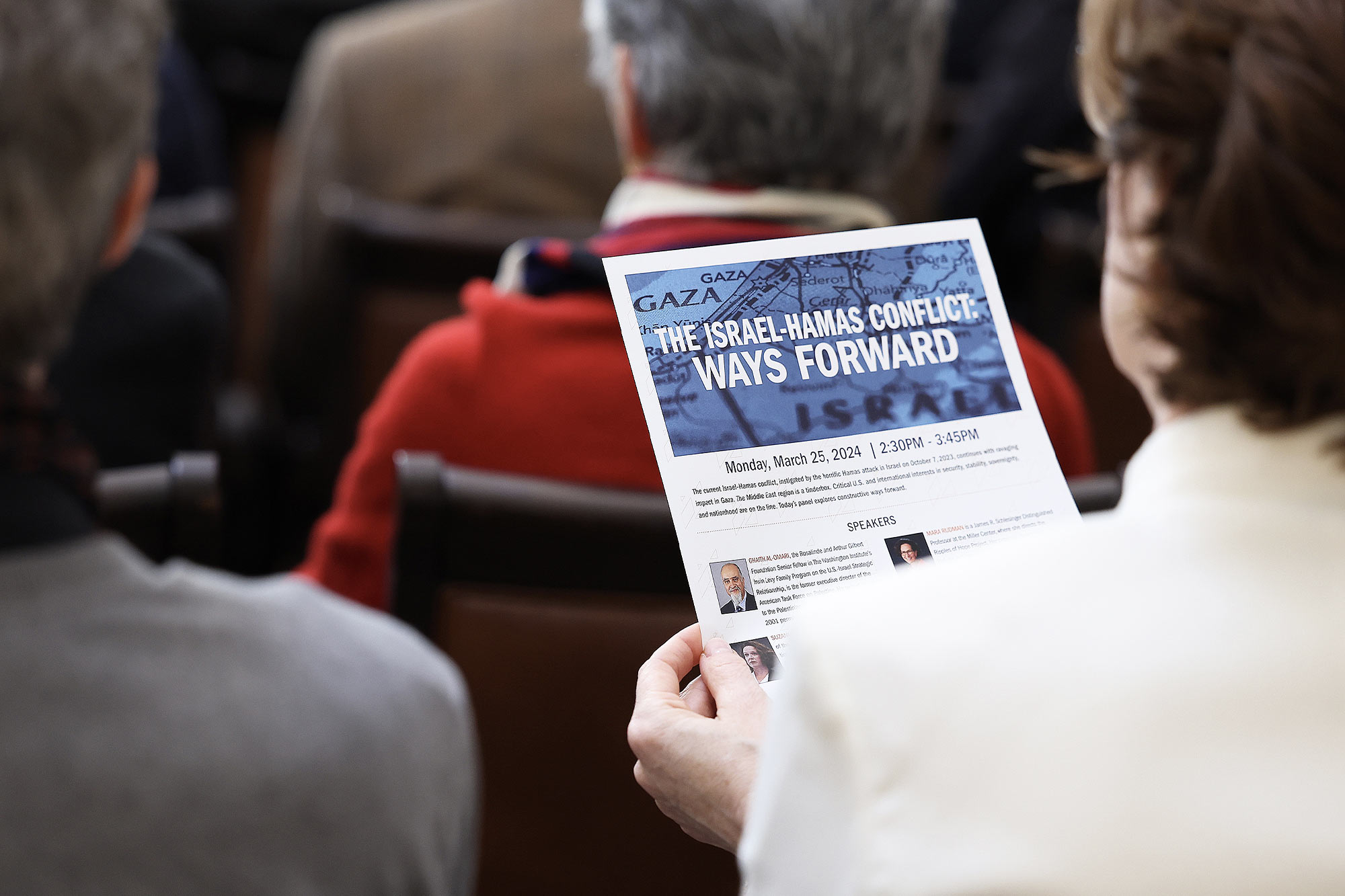The path to a peaceful settlement of the armed conflict in Gaza requires a commitment to separate Israeli and Palestinian states and a change in leadership for both Hamas and Israel, a panel of experts told a Rotunda Dome Room audience on Monday.
Organized and presented by the University of Virginia’s Miller Center of Public Affairs and UVA Global, the program featured speakers with extensive experience in Israeli, Palestinian and Middle Eastern politics. The three panelists agreed that a ceasefire, such as the one demanded by the United Nations on Monday, could only be a start.
“Recognizing what is happening in Gaza today is now, technically, a famine situation. Imagine a situation absolutely horrific. Those scenes are going to radicalize Palestinians and others and empower bad actors like Iran,” Suzanne Maloney of the Brookings Institution, an expert on the Arab region, said.
“We need to bring us to a place where we can actually put reforms in place, including political transition both in Israel and in Gaza,” she said, “and the sooner we start to reach that ultimate horizon.”
To make those changes, attitudes must change first, the panelists said. Ghaith al-Omari, who served as an adviser to the Palestinian team that negotiated the Palestinian state agreement, said accepting Israel’s right to exist, as opposed to considering it as an occupation force, is a step in the right direction.
“If one means by the word ‘occupation’ a code for saying that Israel has a right to exist, that’s fine,” he said. “I want to see the same focus for the Palestinian state, in which my colleagues and compatriots want to be able to express our national identities.”

From left, Mara Rudman, Schlesinger Distinguished Professor at the Miller Center, moderated the panel featuring Israel expert Nimrod Novik, Palestinian Authority adviser Ghaith al-Omari and Suzanne Maloney of the Brookings Institution. (Photo by Matt Riley, University Communications)
Nimrod Novik, former senior adviser on foreign policy to the late Israeli Prime Minister Shimon Peres when he was in office, said the Israeli government should abandon the thought of a one-state system revolving around Israel and work toward a two-state solution.
“A government that does not work in order to separate the Israelis from Palestinians and eventually create a two-state solution is betraying us as Israeli citizens,” Novik said. “The next Israeli government should not be pollyannish about how easy it is to change. The moment you start the process in the other direction, gradually, stop settlement expansion, remove some of the illegal settlements, and stop playing games with the Palestinian Authority’s budget, allow it to develop, enhance the capacity to Palestinian Authority, change happens.”
The same must occur in Gaza and the Palestinian Authority, al-Omari said.
“When four of five Palestinians believe their leaders are crooks, it’s hard to see they will ever believe and support their leaders,” he said.
Maloney said the two-state solution is also the best way to stabilize the historic conflict between Israel and Palestinians, and stabilizing the region will work in the best interest of the U.S.
“One of the most important things for the international community to recognize that to shift to the next phase with both rebuilding and creating a political pathway to some kind of Palestinian sovereignty, is that it is the only way that we’re going to be able to marginalize the worst actors,” she said.
“The war has empowered Iran, and Iran is now a critical ally to deal with Russia and China,” Maloney said. “It’s not just about great power competition in the intervention of China and Russia in the region, it’s also about the fact that countries like Iran and North Korea are, you know, taking advantage of the opportunity provided by this conflict to bolster their own relationships to ensure they will dominate the nature of the region.”
Media Contacts
Assistant Editor, UVA Today Office of University Communications
bkm4s@virginia.edu 434-924-3778




